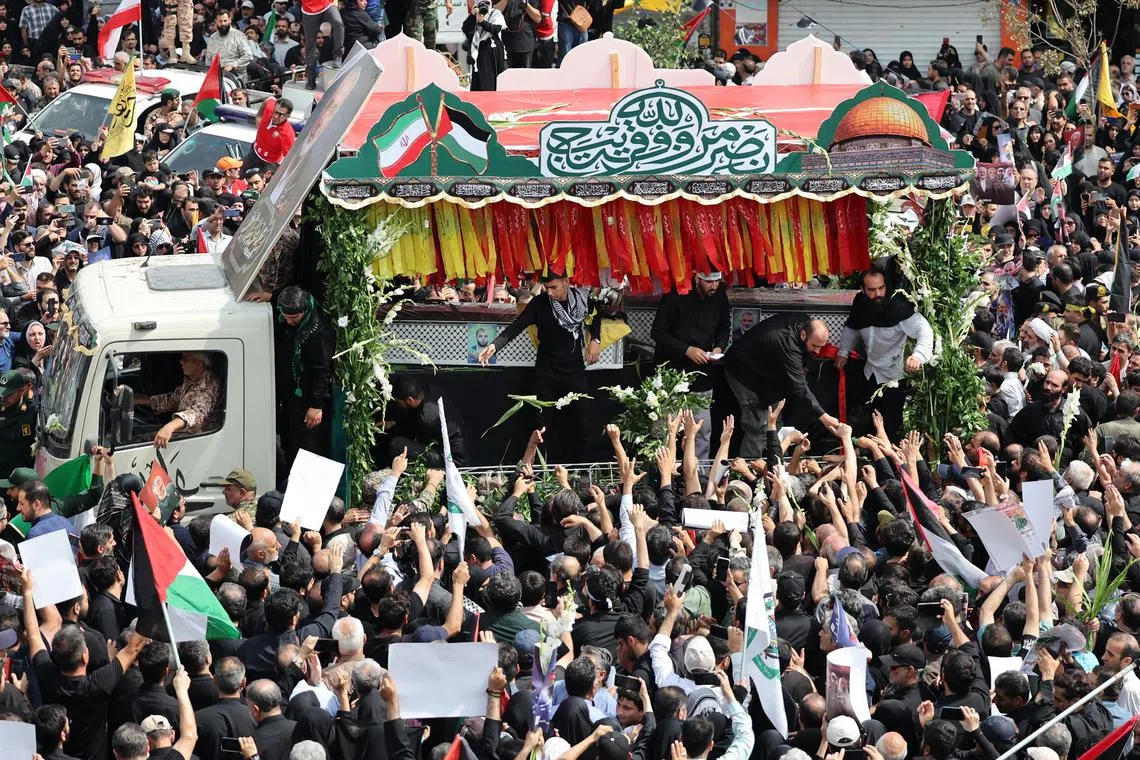Calls for revenge as Iranians mourn top Hamas leader Ismail Haniyeh
Sign up now: Get ST's newsletters delivered to your inbox

A truck carrying the coffins of Hamas leader Ismail Haniyeh and his bodyguard during a funeral procession in Tehran on Aug 1.
PHOTO: EPA-EFE
TEHRAN – Iranians turned out to mourn the death of Ismail Haniyeh on Aug 1, with calls for revenge a day after Hamas’ political chief was assassinated in Iran’s capital in an attack blamed on Israel.
This comes amid new reports that Haniyeh was killed with an explosive device covertly smuggled two months earlier into the guest house where he was staying.
Iran’s Supreme Leader, Ayatollah Ali Khamenei, led prayers at Haniyeh’s funeral at Tehran University, where thousands of mourners dressed in black chanted “Death to Israel!” and “Death to America!”.
Iran’s state television showed the coffins of Haniyeh and his bodyguard covered in Palestinian flags during the ceremony attended by senior Iranian officials, including President Masoud Pezeshkian and the Islamic Revolutionary Guard Corps chief, General Hossein Salami.
The caskets, with a black-and-white pattern resembling a Palestinian keffiyeh scarf, were borne on a flower-decorated truck through city streets jammed with mourners cooled by water spray on a hot day.
Haniyeh’s body will be flown to Qatar for burial on Aug 2.
Iran’s Revolutionary Guards had announced Haniyeh’s death. It said he and a bodyguard were killed in a strike
Citing seven Middle Eastern officials, The New York Times reported on Aug 1 that the bomb that killed Haniyeh was detonated remotely once it was confirmed that he was inside the Tehran guest house run and protected by the Revolutionary Guards.
The explosion shook the building, shattered some windows and caused the partial collapse of an exterior wall, the Times said, citing two Iranian officials.
Haniyeh was said to have stayed at the guest house several times when visiting Tehran.
The blast came just hours after Israel targeted and killed top Hezbollah commander Fuad Shukr
Israel has declined to comment on the Tehran strike.
“Rest in peace, Abu Al-Abed Ismail Haniyeh. Our nation, Iran, the Axis of Resistance, your people, your fighters... are united in the choice of resistance to end the Zionist occupation,” Hamas’ deputy chief in Gaza, Khalil Al-Hayya, said in a televised speech at Tehran University.
“We will pursue Israel until it is uprooted from the land of Palestine,” he said.
Hamas’ armed wing said in a statement that Haniyeh’s killing would “take the battle to new dimensions and have major repercussions”.
Vowing to retaliate, Iran declared three days of national mourning on July 31, and said the United States bore responsibility because of its support for Israel.
“All fronts of the resistance will take revenge for Haniyeh’s blood,” Mr Ali Akbar Ahmadian, the secretary of Iran’s Supreme National Security Council, told Iran’s semi-official Mehr news agency.
Conservative parliamentary speaker Mohammad Bagher Ghalibaf said Iran “will certainly carry out the Supreme Leader’s order (to avenge Haniyeh)”.
“It is our duty to respond at the right time and in the right place,” he said.
Supreme Leader Khamenei had said after Haniyeh’s death that it is “our duty to seek revenge for his blood as he was martyred in the territory of the Islamic Republic of Iran”.
The New York Times, citing Iranian officials, reported that Ayatollah Khamenei has ordered that Iran strike Israel directly.
“The Zionists (Israel) will soon see the consequences of their cowardly and terrorist act”, President Pezeshkian said on July 31.
While Iran has blamed the assassination on its arch-foe, Israel has declined to comment on Haniyeh’s death. But it did claim the killing of Hezbollah commander Shukr, blaming him for a weekend rocket strike that killed 12 young people
The Israeli military also confirmed that the head of Hamas’ military wing, Mohammed Deif, was killed in an air strike in Gaza in July.
Deif is believed to have been one of the masterminds of Hamas’ Oct 7 attack on southern Israel
The killings are the latest of several incidents that have inflamed regional tensions amid the war in Gaza, which has drawn in Iran-backed militant groups in Syria, Lebanon, Iraq and Yemen.
One of them, Yemen’s Houthi rebels, “declared three days of mourning” for Haniyeh, according to the group’s Saba news agency.
The international community, however, called for calm and a focus on securing a Gaza ceasefire, which Haniyeh had accused Israel of obstructing.
United Nations Secretary-General Antonio Guterres said the strikes in Tehran and Beirut represented a “dangerous escalation”.
The UN Security Council convened an emergency meeting on July 31 at Iran’s request to discuss the incident.
In a phone call, the foreign ministers of Jordan and Egypt blamed Israel for rising tensions and “stressed the need to work on de-escalation to prevent the region from slipping into a comprehensive regional conflict”, Jordan’s official Petra news agency reported.
US Secretary of State Antony Blinken on Aug 1 reiterated appeals for an end to fighting.
But the prime minister of key ceasefire broker Qatar said Haniyeh’s killing had thrown the whole Gaza war mediation process into doubt.
“How can mediation succeed when one party assassinates the negotiator on the other side?” Sheikh Mohammed bin Abdulrahman Al-Thani said on social media site X.
Hamas has, for months, been indirectly negotiating a truce and hostage-prisoner exchange deal with Israel, in talks facilitated by Egypt, Qatar and the US.
Israeli Prime Minister Benjamin Netanyahu has vowed to destroy Hamas in retaliation for the Oct 7 attack.
That attack resulted in the deaths of 1,197 people, mostly civilians. Militants also seized 251 hostages, 111 of whom are still held captive in Gaza, including 39 the military says are dead.
Concern over the fate of those still held has grown among Israelis.
Haniyeh’s killing “was a mistake as it threatens the possibility of having a hostage deal”, said Mr Anat Noy, a resident of the coastal city of Haifa. AFP, REUTERS


